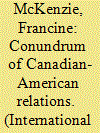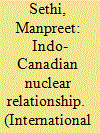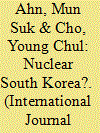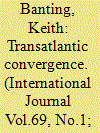|
|
|
Sort Order |
|
|
|
Items / Page
|
|
|
|
|
|
|
| Srl | Item |
| 1 |
ID:
129554


|
|
|
|
|
| Publication |
2014.
|
| Summary/Abstract |
Forty years ago, political scientist Denis Stairs published The Diplomacy of Constraint, an account of Canadian involvement in the Korean War. Stairs explored the attempts of Canadian politicians, diplomats, and bureaucrats to constrain US intervention in Korea and, more generally, to influence the conduct of its foreign policy in the pressurized context of the early Cold War. Since then, historians and political scientists have continued to publish accounts of Canadian involvement in the Korean War and books on Canada-US relations in general. Why, then, should someone read The Diplomacy of Constraint today when there are more recent analyses? This review essay attempts to explain the longevity and usefulness of Stairs' study. What have scholars learned from Stairs' interpretation and approach? Has he influenced subsequent academic analyses? Can his study be considered a model of interdisciplinary scholarship? Finally, is new scholarship intrinsically better than old?
|
|
|
|
|
|
|
|
|
|
|
|
|
|
|
|
| 2 |
ID:
129548


|
|
|
|
|
| Publication |
2014.
|
| Summary/Abstract |
Canada was among the first countries to participate in India's nuclear power program. Not only was CIRUS the first research reactor to be built in India with outside help; it was also Canada's first reactor export and marked a breakthrough for its nuclear industry. But the nuclear relationship foundered when India conducted a peaceful nuclear explosion in 1974. Differences over non-proliferation and Cold War considerations kept India and Canada apart until the turn of the millennium. Then a number of factors coalesced in the first decade of the 21st century to lead the two countries to reconsider their nuclear engagement and sign a nuclear cooperation agreement in 2010. What made this possible? What are the major contours of the agreement? What potential does it hold? And what issues still bedevil the nuclear relationship? This article provides a new perspective on the possibilities and challenges of the Indo-Canadian nuclear relationship and highlights the importance of the nuclear dimension in their larger bilateral engagement. While the paper acknowledges that the relationship was influenced by Cold War considerations, it steers clear of the issues of alignment and non-alignment and deals with the historical context of the relationship only to extrapolate the possibilities and challenges for the future.
|
|
|
|
|
|
|
|
|
|
|
|
|
|
|
|
| 3 |
ID:
129546


|
|
|
|
|
| Publication |
2014.
|
| Summary/Abstract |
For two decades the Korean peninsula has been mired in a perilous nuclear brinkmanship with no end in sight. The paralysis is attributable in part to the widespread perception of North Korea as a "rogue" if not "mad" state, whose security concerns are seen as irrational, paranoiac, and illegitimate. Despite its eccentricities, however, Pyongyang is fundamentally a rational actor pursuing a rational strategy to deal with rational security concerns. Profound structural changes in the international system have rendered North Korea incapable of addressing its security anxiety through either internal balancing by conventional arms buildup or external balancing by Alliance Formation. In this context, nuclearization offers a logical and inexpensive route for Pyongyang to restore the military balance in the Korean peninsula and ensure its own survival.
|
|
|
|
|
|
|
|
|
|
|
|
|
|
|
|
| 4 |
ID:
129551


|
|
|
|
|
| Publication |
2014.
|
| Summary/Abstract |
This paper provides a brief overview of the progress of political science research on the causes of nuclear weapons proliferation and non-proliferation. Based on the findings of that literature, the author draws out some general lessons for today's policymakers.
|
|
|
|
|
|
|
|
|
|
|
|
|
|
|
|
| 5 |
ID:
129547


|
|
|
|
|
| Publication |
2014.
|
| Summary/Abstract |
After North Korea's third nuclear test in February 2013, South Koreans are once again debating whether to go nuclear. Some advocates of South Korean nuclear possession argue that nuclear weapons are necessary for self-defence against the nuclear-armed North. Some support South Korea's nuclearization as leverage vis-à-vis North Korea and China. Some argue that going nuclear will heighten the South's national prestige. However, others counter that South Korea's nuclearization is not desirable and, indeed, barely feasible. First, since North-South conflicts have not diminished since the 1953 truce, the nuclear armament of the two Koreas could result in a nuclear war. Second, the South's nuclearization would only hasten North Korea's ardent pursuit of securing and increasing its stock of nuclear warheads. Third, it would prompt a fierce arms race in Northeast Asia by pressing Japan and Taiwan to go nuclear. Finally, it would undermine Seoul's close ties with Washington. In order to maintain a nuclear-free South Korea, the US needs to reinforce its nuclear umbrella and eradicate the North Korean nuclear threat through active and comprehensive negotiations with Pyongyang.
|
|
|
|
|
|
|
|
|
|
|
|
|
|
|
|
| 6 |
ID:
129550


|
|
|
|
|
| Publication |
2014.
|
| Summary/Abstract |
At first glance, Canada and Europe seem to be diverging dramatically in their approach to immigrant integration. While support for a multicultural approach seems to remain strong in Canada, a potent backlash pervades European debates. This paper argues that beneath the image of transatlantic divergence, there are important elements of convergence. First, the retreat from multiculturalism in Europe is more complete at the level of discourse than policy. With a few notable exceptions, multicultural policies have remained stable or even grown stronger since 2000. In many countries, new integration programs are being layered over multicultural initiatives introduced in earlier decades. Second, many of the new integration policies celebrated as evidence of a U-turn away from multiculturalism resemble programs that have long been part of immigrant integration in Canada. As a result, transatlantic convergence is indeed part of the contemporary story. However, there are also limits to this convergence. While some European countries are opting for liberal, voluntary approaches to integration, which can be combined with a multicultural approach to diversity, others are adopting more obligatory, illiberal versions of civic integration that seem inconsistent with the support for diversity central to a multicultural approach.
|
|
|
|
|
|
|
|
|
|
|
|
|
|
|
|
| 7 |
ID:
129553


|
|
|
|
|
| Publication |
2014.
|
| Summary/Abstract |
Charles de Gaulle's visit to Quebec in 1967 continues to attract significant scholarly and popular attention. Despite ongoing efforts to broaden our understanding of the evolution of France-Quebec relations during the 1960s, de Gaulle's visit remains the pivotal event of that rapprochement and is believed to confirm the French president's personal support for Quebec's independence, stemming from his efforts to position post-colonial France as the champion of decolonization and self-determination for dependent peoples. This scholarly consensus, however, can be challenged by even a cursory glance at France's policies toward New Caledonia in the 1960s, which reflected a fierce French determination to prevent the loss of its Pacific Ocean territory. Instead of accepting, much less encouraging, New Caledonia's autonomy, the French state in fact re-colonized New Caledonia over the course of the 1960s, a situation that compels us to examine more closely the attitude of de Gaulle and the French state toward "decolonization" in Quebec during the same period. The national aspirations that mattered most to France or to de Gaulle were those of France itself.
|
|
|
|
|
|
|
|
|
|
|
|
|
|
|
|
| 8 |
ID:
129549


|
|
|
|
|
| Publication |
2014.
|
| Summary/Abstract |
This article critically examines the ramifications of the international sanctions regime against Iran on two fronts: the conflict pitting Iran against the West, and the impact of the sanctions on state-society relations. On both accounts, it finds the dominant narrative, according to which sanctions would facilitate conflict resolution while weakening the authoritarian state, to be misleading. Instead, it demonstrates, on the one hand, how sanctions have hardened the opposing fronts and therefore prolonged the conflict between Iran and the West, and on the other, how they have cemented the domestic power structure in the Islamic Republic and weakened Iran's civil society.
|
|
|
|
|
|
|
|
|
|
|
|
|
|
|
|
|
|
|
|
|